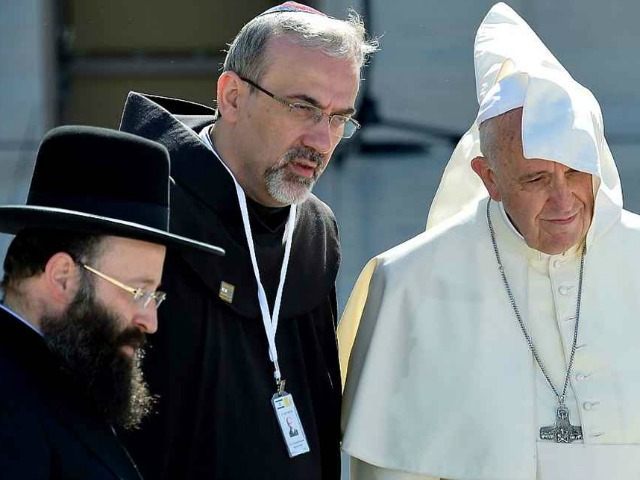In an address to an interreligious audience Wednesday, Pope Francis paid tribute to the Jewish people, noting that in Jewish-Christian relations, “indifference and opposition have turned into cooperation and goodwill.”
In commemorating the 50th anniversary of the historic document Nostra Aetate, which effected significant changes in the way Catholics view people of other faiths, the Pope underscored the important changes in the way Jews and Christians relate to each other.
“We owe special gratitude to God for the dramatic transformation that has taken place over the last 50 years in the relationship between Christians and Jews,” Francis said. “Indifference and opposition have turned into cooperation and goodwill. From enemies and strangers, we have become friends and brothers.”
The document was the product of the Second Vatican Council, and was promulgated by Pope Paul VI fifty years ago to the day, on October 28, 1965.
Appreciation for the importance of this text is not limited to Catholics, but has been stressed by many.
Lord Jonathan Sacks, chief rabbi of the United Kingdom from 1991-2013, has written that Nostra Aetate “brought about one of the greatest revolutions in religious history.” As a result, Sacks wrote, today “Jews and Catholics meet not as enemies but as cherished and respected friends.”
“The Council,” said Francis Wednesday, “with the Declaration Nostra Aetate, paved the way with its ‘yes’ to the rediscovery of the Jewish roots of Christianity and its ‘no’ to any form of anti-Semitism and its condemnation of all insults, discrimination and persecution that come with it.”
While highlighting the unique relationship Christians and Jews share, Francis said that the same principles of fruitful dialogue—such as knowledge, respect and mutual esteem—should also be applied in dealing with other religions.
“I think particularly of the Muslims,” Francis said, who, in the words of the Council, “adore the one God, living and subsisting in Himself; merciful and all-powerful, the Creator of heaven and earth, who has spoken to men.” They “recognize the paternity of Abraham, venerate Jesus as a prophet, honor his virgin mother, Mary, await the day of judgment, and practice prayer, almsgiving and fasting,” he said.
The Pope also cautioned against attributing to all members of a particular faith the errors of a portion. “Because of violence and terrorism an attitude of suspicion or even condemnation of religions has spread,” he said. “In fact, although no religion is immune from the risk of fundamentalist or extremist deviations in individuals or groups, we must look at the positive values that they live and that they propose, and that are sources of hope,” he added.
In recalling the importance of interreligious dialogue, Pope Francis said that the Church regards with esteem the believers of all religions, appreciating their spiritual and moral commitment. At the same time, Francis insisted that Christians, while “open to dialogue with all,” must also be faithful to the truths she believes, “starting with the belief that the salvation offered to all has its origin in Jesus, the only Savior, and that the Holy Spirit is always at work, as a source of peace and love.”
Francis concluded his address by urging his hearers to pray earnestly for the future of interreligious dialogue. If we wish it to succeed, he said, “the first thing we must do is pray.”
“Without the Lord, nothing is possible; with Him, everything becomes possible!” he said.
Follow Thomas D. Williams on Twitter @tdwilliamsrome.

COMMENTS
Please let us know if you're having issues with commenting.